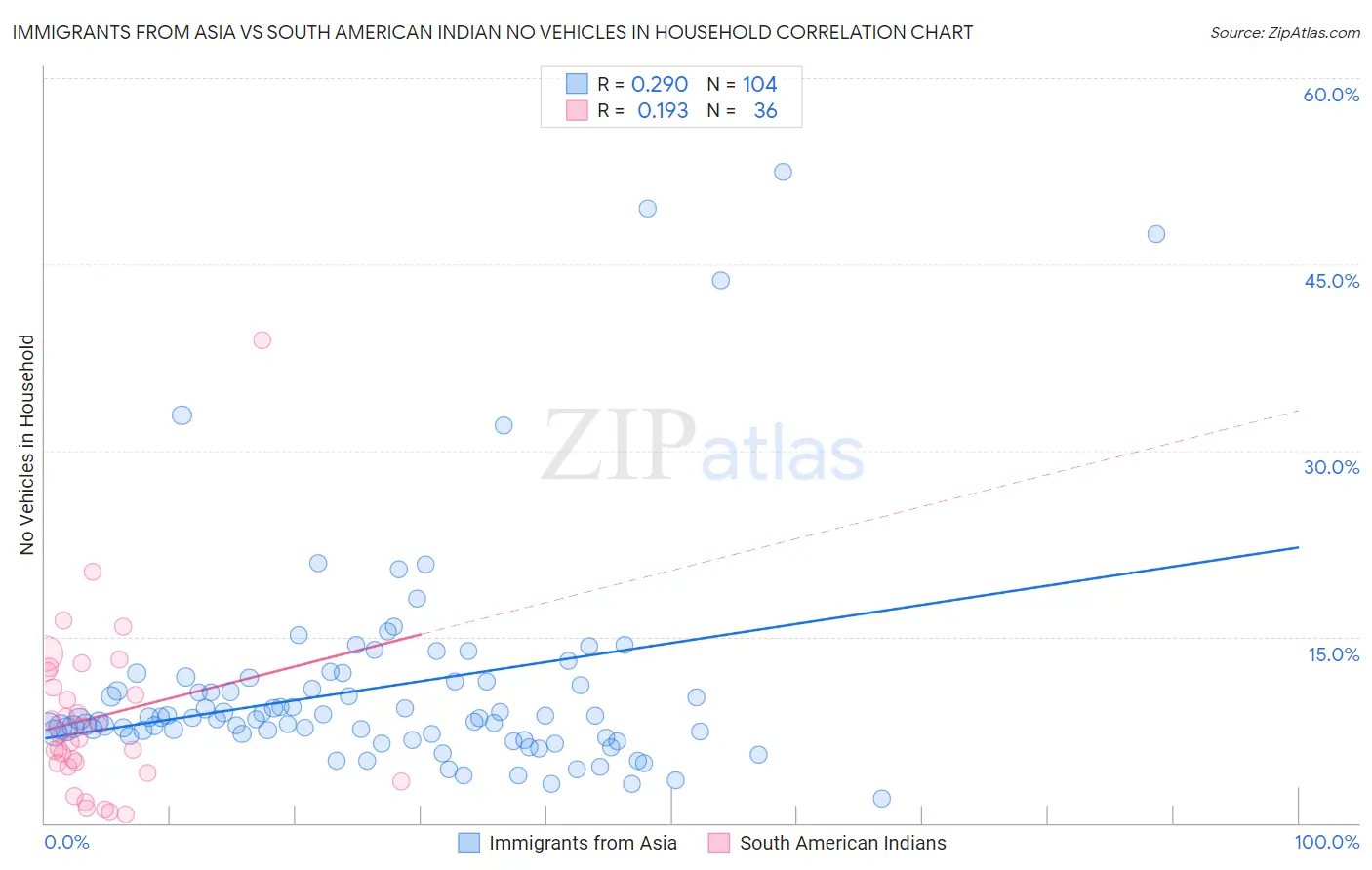Immigrants from Asia vs South American Indian No Vehicles in Household
COMPARE
Immigrants from Asia
South American Indian
No Vehicles in Household
No Vehicles in Household Comparison
Immigrants from Asia
South American Indians
10.9%
NO VEHICLES IN HOUSEHOLD
21.3/ 100
METRIC RATING
199th/ 347
METRIC RANK
12.1%
NO VEHICLES IN HOUSEHOLD
0.9/ 100
METRIC RATING
258th/ 347
METRIC RANK
Immigrants from Asia vs South American Indian No Vehicles in Household Correlation Chart
The statistical analysis conducted on geographies consisting of 545,313,645 people shows a weak positive correlation between the proportion of Immigrants from Asia and percentage of households with no vehicle available in the United States with a correlation coefficient (R) of 0.290 and weighted average of 10.9%. Similarly, the statistical analysis conducted on geographies consisting of 164,483,116 people shows a poor positive correlation between the proportion of South American Indians and percentage of households with no vehicle available in the United States with a correlation coefficient (R) of 0.193 and weighted average of 12.1%, a difference of 11.0%.

No Vehicles in Household Correlation Summary
| Measurement | Immigrants from Asia | South American Indian |
| Minimum | 2.0% | 0.72% |
| Maximum | 52.4% | 38.9% |
| Range | 50.5% | 38.2% |
| Mean | 10.9% | 8.5% |
| Median | 8.4% | 6.9% |
| Interquartile 25% (IQ1) | 7.1% | 4.7% |
| Interquartile 75% (IQ3) | 11.4% | 11.5% |
| Interquartile Range (IQR) | 4.3% | 6.9% |
| Standard Deviation (Sample) | 9.0% | 7.0% |
| Standard Deviation (Population) | 8.9% | 6.9% |
Similar Demographics by No Vehicles in Household
Demographics Similar to Immigrants from Asia by No Vehicles in Household
In terms of no vehicles in household, the demographic groups most similar to Immigrants from Asia are Immigrants from Sweden (10.8%, a difference of 0.31%), Cambodian (10.9%, a difference of 0.33%), Immigrants from Western Europe (10.9%, a difference of 0.44%), Shoshone (10.8%, a difference of 0.52%), and Central American (10.8%, a difference of 0.56%).
| Demographics | Rating | Rank | No Vehicles in Household |
| Carpatho Rusyns | 32.1 /100 | #192 | Fair 10.7% |
| Ukrainians | 28.0 /100 | #193 | Fair 10.7% |
| Pueblo | 27.0 /100 | #194 | Fair 10.8% |
| Immigrants | Brazil | 26.3 /100 | #195 | Fair 10.8% |
| Central Americans | 24.3 /100 | #196 | Fair 10.8% |
| Shoshone | 24.1 /100 | #197 | Fair 10.8% |
| Immigrants | Sweden | 22.9 /100 | #198 | Fair 10.8% |
| Immigrants | Asia | 21.3 /100 | #199 | Fair 10.9% |
| Cambodians | 19.6 /100 | #200 | Poor 10.9% |
| Immigrants | Western Europe | 19.1 /100 | #201 | Poor 10.9% |
| Romanians | 17.9 /100 | #202 | Poor 10.9% |
| Iroquois | 17.6 /100 | #203 | Poor 10.9% |
| Guatemalans | 16.1 /100 | #204 | Poor 11.0% |
| Immigrants | Chile | 15.9 /100 | #205 | Poor 11.0% |
| Somalis | 15.9 /100 | #206 | Poor 11.0% |
Demographics Similar to South American Indians by No Vehicles in Household
In terms of no vehicles in household, the demographic groups most similar to South American Indians are Nigerian (12.1%, a difference of 0.020%), Immigrants from Latvia (12.1%, a difference of 0.24%), Liberian (12.0%, a difference of 0.76%), Macedonian (12.2%, a difference of 0.80%), and Honduran (12.0%, a difference of 0.81%).
| Demographics | Rating | Rank | No Vehicles in Household |
| Blacks/African Americans | 1.6 /100 | #251 | Tragic 11.9% |
| Immigrants | Serbia | 1.5 /100 | #252 | Tragic 11.9% |
| Egyptians | 1.4 /100 | #253 | Tragic 11.9% |
| Immigrants | Uruguay | 1.3 /100 | #254 | Tragic 11.9% |
| Hondurans | 1.2 /100 | #255 | Tragic 12.0% |
| Liberians | 1.2 /100 | #256 | Tragic 12.0% |
| Nigerians | 0.9 /100 | #257 | Tragic 12.1% |
| South American Indians | 0.9 /100 | #258 | Tragic 12.1% |
| Immigrants | Latvia | 0.8 /100 | #259 | Tragic 12.1% |
| Macedonians | 0.7 /100 | #260 | Tragic 12.2% |
| Sub-Saharan Africans | 0.6 /100 | #261 | Tragic 12.2% |
| Immigrants | Liberia | 0.6 /100 | #262 | Tragic 12.2% |
| Immigrants | Egypt | 0.6 /100 | #263 | Tragic 12.2% |
| Immigrants | Switzerland | 0.5 /100 | #264 | Tragic 12.3% |
| Africans | 0.4 /100 | #265 | Tragic 12.3% |